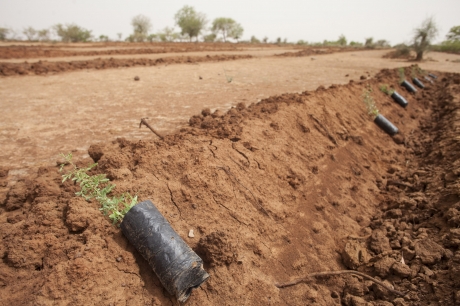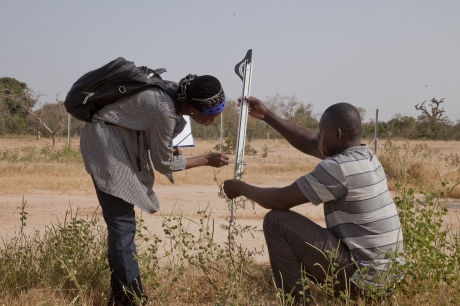The field of Acacia trees is her testing ground. Here she is monitoring the development of these gum-producing trees, which have been inoculated with different natural, symbiotic bacteria and fungi. She wants to find out if, and how, they help the trees to become more resistant to drought, grow better and produce more gum.
The restoration plots are part of FAO’s Action Against Desertification (AAD) programme supporting the Great Green Wall initiative in Burkina Faso. Barkissa’s research, a result of partnership between INERA and AAD programme, is one example of how the programme is working to make degraded land in the Sahel green and productive again.
In this area, where the challenges posed by climate change and desertification are particularly acute, rainfall hardly exceeds 400 millimeters per year and land is severely degraded. So far, AAD has initiated restoration of over 7 000 hectares in Burkina Faso.
Barkissa’s research reinforces AAD’s restoration work in this area of the Sahel. More than a year into the experiment Barkissa’s measurements are encouraging, and the AAD programme aims to make these useful micro-organisms available to the local population. Efforts are already underway to train them in how to inoculate their seeds and plants.
Asked about her motivation, Barkissa says she opted for studies in agronomy because she is fond of plants and always wanted to work in the countryside. Her parents have supported her from the start. But sometimes, she misses being with her family. It is a long way back home to Bobo-Dioulasso, Burkina Faso’s second largest-city in the south, where her father runs a vulcanization workshop and her mother sells condiments in front of the house.
Barkissa expects to defend her thesis in early 2020. She is confident that the results of her research can help the Sahel make it to its goal. And she will certainly do her part: “I have always tried to do my best to make things work.”
The AAD programme supports rural communities in Africa, as well as in the Caribbean and Pacific, with large-scale restoration of degraded land, stimulating economic growth and development. This programme is a key partner of the Great Green Wall initiative, Africa’s flagship project to combat climate change and desertification. This initiative creates productive landscapes across North Africa, the Sahel and the Horn of Africa, addressing food insecurity and poverty in the area. By February 2019, the AAD programme will have reached an estimated 500 000 people and restored approximately 50 000 hectares of degraded land.
SOURCE:
FAO
COVER IMAGE:
Barkissa monitors the development of Acacia trees on an experimental site in northern Burkina Faso. ©FAO/Gideon Vink


